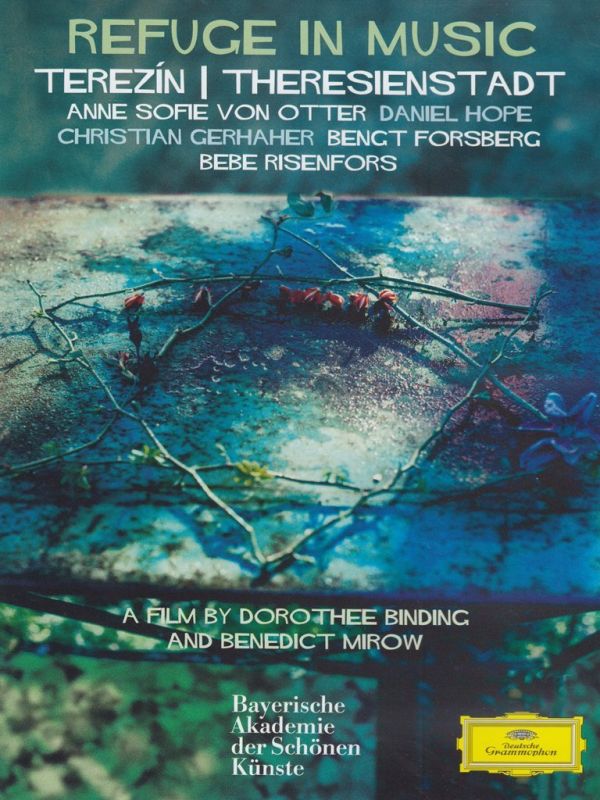Terezín: Refuge in Music
View record and artist detailsRecord and Artist Details
Composer or Director: Viktor Ullmann, Karel Svenk, Pavel Haas, Ervín Schulhoff, Ilse Weber, Carlo S. Taube, Martin Roman, Adolf Strauss, Hans Krása, Imre (Emmerich) Kálmán
Genre:
Vocal
Label: Deutsche Grammophon
Magazine Review Date: 04/2014
Media Format: Digital Versatile Disc
Media Runtime: 106
Mastering:
DDD
Catalogue Number: 073 5077GH

Tracks:
| Composition | Artist Credit |
|---|---|
| Ich wandre durch Theresienstadt |
Ilse Weber, Composer
Anne Sofie von Otter, Mezzo soprano Bebe Risenfors, Accordion Bengt Forsberg, Piano Ilse Weber, Composer |
| Pod destnikem |
Karel Svenk, Composer
Anne Sofie von Otter, Mezzo soprano Bebe Risenfors, Accordion Bengt Forsberg, Piano Karel Svenk, Composer |
| Vsechno jde! |
Karel Svenk, Composer
Anne Sofie von Otter, Mezzo soprano Bebe Risenfors, Accordion Bengt Forsberg, Piano Karel Svenk, Composer |
| Ade, Kamerad! |
Ilse Weber, Composer
Christian Gerhaher, Baritone Gerold Huber, Piano Ilse Weber, Composer |
| Und der Regen rinnt |
Ilse Weber, Composer
Anne Sofie von Otter, Mezzo soprano Bebe Risenfors, Accordion Bengt Forsberg, Piano Ilse Weber, Composer |
| Ich weiß bestimmt, ich werd Dich wiedersehn |
Adolf Strauss, Composer
Adolf Strauss, Composer Anne Sofie von Otter, Mezzo soprano Bengt Forsberg, Piano |
| Gräfin Mariza, 'Countess Maritza', Movement: Komm mit nach Varasdin |
Imre (Emmerich) Kálmán, Composer
Christian Gerhaher, Baritone Gerold Huber, Piano Imre (Emmerich) Kálmán, Composer |
| Karussell |
Martin Roman, Composer
Anne Sofie von Otter, Mezzo soprano Bengt Forsberg, Piano Martin Roman, Composer |
| Wiegala |
Ilse Weber, Composer
Anne Sofie von Otter, Mezzo soprano Bebe Risenfors, Guitar Ilse Weber, Composer |
| (3) Songs |
Hans Krása, Composer
Christian Gerhaher, Baritone Hans Krása, Composer Ib Hausmann, Clarinet Josephine Knight, Cello Philip Dukes, Viola |
| Ein jüdische Kind |
Carlo S. Taube, Composer
Anne Sofie von Otter, Mezzo soprano Bengt Forsberg, Piano Carlo S. Taube, Composer Ib Hausmann, Clarinet |
| (3) Jiddische Lieder, Movement: Berjoskele |
Viktor Ullmann, Composer
Anne Sofie von Otter, Mezzo soprano Bengt Forsberg, Piano Viktor Ullmann, Composer |
| (6) Sonnets, Movement: Clere Venus |
Viktor Ullmann, Composer
Anne Sofie von Otter, Mezzo soprano Bengt Forsberg, Piano Viktor Ullmann, Composer |
| (6) Sonnets, Movement: On voit mourir toute chose animée |
Viktor Ullmann, Composer
Anne Sofie von Otter, Mezzo soprano Bengt Forsberg, Piano Viktor Ullmann, Composer |
| (6) Sonnets, Movement: Je vis, ie meurs |
Viktor Ullmann, Composer
Anne Sofie von Otter, Mezzo soprano Bengt Forsberg, Piano Viktor Ullmann, Composer |
| (4) Songs on Chinese Poetry |
Pavel Haas, Composer
Christian Gerhaher, Baritone Gerold Huber, Piano Pavel Haas, Composer |
| Sonata for Solo Violin |
Ervín Schulhoff, Composer
Daniel Hope, Violin Ervín Schulhoff, Composer |
Author: David Patrick Stearns
Camp survivors are interviewed, including the guitarist Coco Schumann, who returns to where he was once imprisoned, and the Czech pianist Alice Herz-Sommer (whose death was reported days before this issue of Gramophone went to press), who was to Terezín what Dame Myra Hess was to the London Blitz, playing several concerts a day. Written accounts go even deeper, most remarkably those of the late Ilse Weber, a poet who pre-emptively sent her own son to safety in Stockholm and, once in Terezín, often sang her self-authored lullaby to displaced children and even volunteered to go with them to Auschwitz (children were disposed of early because they were less useful) so they could all die together.
Even those who have closely followed the rising Terezín awareness might be startled to find that conditions were even worse than previously described. It’s as if this music couldn’t truly be presented in its proper context until the public, increasingly well informed about the war, was able to take it. In fact, much of this music was known before its 1990s rediscovery but the special commitment of post-war musicians was necessary to get it out there. Von Otter, for one, was motivated by the memory of her Swedish diplomat father, who attempted to call attention to the concentration camp atrocities during the war, was greeted with indifference by his superiors and, for the rest of his life, regretted not having done more.
The film isn’t a monumental guilt trip; ultimately, it’s about having a life beyond one of history’s greatest tragedies. Some Holocaust survivors are burdened with untreated post-traumatic stress disorder and loss of observational perspective. Not Schumann and Herz-Sommer. By the end of the film, we know why they can face the past and find joy in the present.
How important is the music itself? We won’t know that for a while. As Hope puts it, the music doesn’t need its back-story to be valid, but the story is there and always will be. In the Munich concert, everyone is at their best. If Von Otter has been somewhat chilly in the past, she isn’t here. But the cost of performing this music is much more evident (everyone is on the verge of tears at various points) than on the 2008 CD. And if this DVD doesn’t get many repeat viewings in my household, it’s because there’s not a moment that’s not deeply burnt into my memory.
Explore the world’s largest classical music catalogue on Apple Music Classical.
Included with an Apple Music subscription. Download now.

Gramophone Digital Club
- Digital Edition
- Digital Archive
- Reviews Database
- Events & Offers
From £9.20 / month
Subscribe
Gramophone Club
- Print Edition
- Digital Edition
- Digital Archive
- Reviews Database
- Events & Offers
From £11.45 / month
Subscribe
If you are a library, university or other organisation that would be interested in an institutional subscription to Gramophone please click here for further information.






